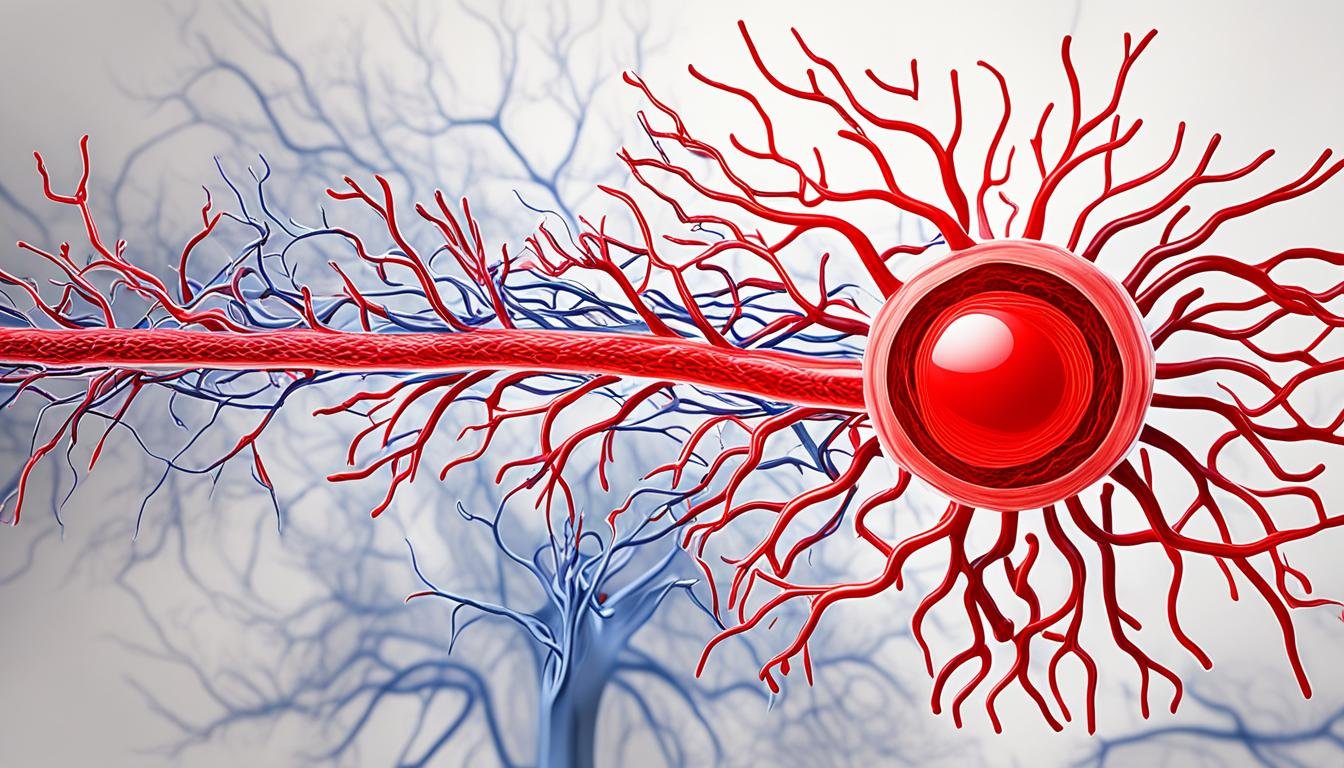The American Red Cross cares for its donors’ health. They want donors to know about their well-being.1 High blood pressure, which is often missed, is a big concern. Still, treating it lowers risks like kidney and heart problems. Sharing this info aims to close care gaps.
Key Takeaways
- Individuals with high blood pressure may be ineligible to donate plasma due to potential adverse effects on their health.
- Plasma donation centers have strict guidelines regarding acceptable blood pressure levels for donation to ensure the safety of donors.
- Effectively managing high blood pressure through lifestyle modifications and medications can help individuals meet the eligibility criteria for plasma donation.
- Donors have a responsibility to be transparent and honest about their medical history and current health status during the screening process.
- Raising awareness about hypertension and the importance of early detection and treatment can benefit both the donor community and the overall plasma supply.
Understanding Plasma Donation Guidelines
Plasma donation, also known as plasmapheresis, takes plasma and returns the other parts to the donor.2 To donate, you must meet certain health criteria, including appropriate blood pressure numbers.3 Having high blood pressure or taking medications for it is okay except for beta-blockers.2 Donors’ blood pressure is always checked, and if it’s too high or low, they might not be able to donate.3 The safety of plasma is very important to organizations like the Red Cross, so they carefully watch over donors.
Eligibility Criteria for Plasma Donors
The FDA made changes to donation rules to reduce HIV risks more fairly.2 Sometimes, donors have to wait to give plasma, either for a short time, a long time, or forever.2 People with high blood pressure, epilepsy, HIV/AIDS, or primary immunodeficiency can’t donate.2 Also, anyone getting a new tattoo must wait 3-6 months before donating.2 You can start donating plasma at 18, but some places won’t take donors over 64.2
Blood Pressure Requirements for Plasma Donation
The FDA says your blood pressure should be not too high and not too low when you donate.3 Also, your pulse should be steady and between 50 and 100 beats per minute.3 Some people find the rules on checking your health for donating plasma a bit hard.3 But, it’s important for a doctor to make sure you’re healthy enough to donate, even if your numbers are a little off.3
Importance of Donor Health and Safety
The FDA highlights checking blood pressure and pulse limits to keep donors safe.3 If you’ve had a human-to-human organ/tissue transplant, you might need to wait 3 months before donating plasma.2 And those who’ve had a bone marrow transplant aren’t usually allowed to donate for 6 months to a year.2 Being on certain drugs or having anemia could also mean you can’t donate.2
After surgery or getting blood, you need to wait up to three months before donating.2 If you’ve been in jail for over 72 hours, you can’t donate for a year after you’re released.2 Also, travel to malaria or high-risk areas may disqualify you from donating, with a focus on diseases like Zika and Ebola.2 The final say on who can donate plasma is with the collection place. Even if you think you’re eligible, something else might come up.2
High Blood Pressure and Its Impact
High blood pressure, or hypertension, is big in the U.S. It means your blood pushes too hard against your arteries.2 This can cause big problems like heart disease, stroke, and kidney issues. So, staying on top of managing high blood pressure helps you live a healthier life.
Defining High Blood Pressure (Hypertension)
Having high blood pressure means your numbers are consistently high. The top number should be 130 mmHg or more, or the bottom number should be 80 mmHg or more.2 Keeping these numbers in check is key for a good heart and all-around health.
Risks Associated with High Blood Pressure
High blood pressure packs a punch when it comes to your health. It ups your chance of heart disease, stroke, and more.2 Plus, it can wear down your blood vessels and heart over time. Tackling hypertension head-on with lifestyle changes and medicine lowers these risks and keeps you well.
Why Can’t You Donate Plasma with High Blood Pressure?
If your blood pressure is too high, you can’t donate plasma.1 This is because plasma donation lowers your blood pressure for a short time. For people with high blood pressure already, this could cause problems like feeling dizzy or even fainting.1 So, it’s all about keeping donors safe and the plasma supply clean. Plasma centers have set rules to make sure only those with healthy blood pressure donate.
Potential Adverse Effects on Donors
A sudden drop in blood pressure is dangerous, especially for those with high blood pressure (hypertension).1 This drop can make a person feel dizzy or lightheaded, even leading to fainting.1 It’s a risk to the donor’s health and safety, so plasma centers are careful about who can donate.
Maintaining Safe Plasma Supply
Plasma centers work hard to keep the supply of plasma safe.1 They have strict rules about blood pressure to avoid any issues.1 These rules protect donors with hypertension from any potential risks related to their blood pressure dropping too much during donation.
Temporary Deferral Conditions
To donate plasma,2 you must have a blood pressure within certain limits. Usually, your systolic should be between 90-180 and diastolic between 50-100.4 If your blood pressure readings fall outside these numbers, you might not be able to donate for a while.5
Guidelines for Blood Pressure Levels
If your blood pressure isn’t right, you can try again after resting for 15 minutes. This chance is available twice.2 After that, if it’s still too high or low, you’ll be asked to come back another day. You’ll also get info on what the problem might be.2
Retesting and Deferral Periods
Temporary hold on donating plasma can last a day, or as long as up to 6 months. In some cases, you may never be able to donate.2 People with long-term health issues such as high blood pressure cannot donate at all.2 There are many reasons for not being able to donate, including new tattoos or certain drugs.2
Often, you’ll just have to wait a day if you’re not eligible for other temporary reasons. But it could be up to 6 months or more.4 Things like high blood pressure or certain medications could be why.4
Managing High Blood Pressure for Plasma Donation
People with high blood pressure can donate plasma by keeping their condition in check. They should focus on lifestyle changes like eating well, exercising, and relaxing more. This can lower their blood pressure and make them healthier.6
Lifestyle Modifications
Eating plenty of fruits, veggies, and whole grains is good for your blood pressure. Also, doing activities like walking fast, riding a bike, or swimming can help. Don’t forget about managing stress. Things like meditation or yoga can be very helpful. They also play a big part in keeping blood pressure under control.6
Medication Considerations
If you take medicine for high blood pressure, you might still donate plasma. But, some drugs, like beta-blockers, could stop you from donating. Talk to your doctor to make sure your medicines won’t affect the process. You both can come up with a plan that lets you donate safely.6
Changing how you live and working with your healthcare team are key. This way, those with high blood pressure can manage their condition and help others by donating plasma.6
Informed Consent and Donor Education
Before becoming a plasma donor, there’s a7 detailed screening process. It makes sure you know the risks and agree to donate. They check your blood pressure, talk about your health history, and ask about medicines you take.8 Also, they explain how important it is to be honest and fit the guidelines for safety. This keeps both you and the plasma supply safe.
Pre-Donation Screening
Checking donors before they give plasma is key to informed consent and safety. They start by looking at your blood pressure and chatting about your health past.8 This deep check uncovers health issues that might affect your safety or the plasma supply’s.
Understanding Personal Health Risks
At plasma donation sites, making sure donors know their health risks is top. They teach people about the risks and what qualifies them to donate. If you have a health issue or you’ve traveled to certain places, it’s crucial to mention it. This info helps donors make well-informed choices and ensures the plasma supply’s quality.
Plasma Donation and Blood Pressure: Research Insights
A 16-week study looked at how plasma donations affect cholesterol in healthy donors.9 Researchers checked the donors’ blood pressure before they gave plasma. They found that both systolic and diastolic blood pressure could drop after donation. This was more noticeable in people who started with high blood pressure.9
Study on Plasma Donation and Blood Pressure Changes
The study showed a big blood pressure drop in donors with Stage 2 hypertension. It took about 14 days after donation to return to normal.9 These results underline the need to watch donors closely, especially those with high blood pressure.
Dynamic Models and Recovery Period
Researchers used detailed models to understand plasma donation effects on blood pressure. They could figure out how long it took for blood pressure to get back to normal in donors with high starting levels.9 This knowledge is crucial for centers to ensure donor health and safety, especially for those with conditions like hypertension.
Safe Plasma Donation Practices
Plasma donation centers have strict rules to keep donors safe. This includes checking vital signs before, during, and after donating.3 Donors sit down and are watched closely after they give plasma.3 If problems like a big change in blood pressure are seen, donors get extra care.3 Keeping up with these safe plasma donation practices, donor preparation and monitoring, and post-donation care and follow-up is key. It helps protect donors’ health, especially if they have conditions like high blood pressure.
Donor Preparation and Monitoring
Before donating plasma, donors go through a detailed check. This checks their blood pressure and pulse.3 Donors need to have their blood pressure and pulse at certain levels to give. For blood pressure, it must be no lower than 90/50 and no higher than 180/100.3 Their pulse needs to be steady, between 50 and 100 beats per minute.3 If a donor’s readings are too high or too low, they might still donate. This is if a doctor says it’s okay for their health.3
Post-Donation Care and Follow-Up
After donating, donors’ health is carefully watched.3 If their blood pressure or other signs change a lot, they get medical help.3 This focus on post-donation care and follow-up is crucial. It helps protect the health of donors, especially those with health issues like high blood pressure.
Alternatives for Individuals with High Blood Pressure
People with high blood pressure might not donate plasma, but they can still help. They could give their time, talk about how vital plasma donations are7, and push for better policies. These efforts could improve the situation for donors and maintain plasma supplies.7
Other Ways to Support Plasma Donation Centers
Unable to donate blood doesn’t mean they can’t aid plasma centers. By volunteering, organizing blood drives, or giving money, they also support the cause.7
Raising Awareness and Advocacy
They can raise awareness and advocate for plasma donations. This could involve telling others, taking part in educational drives, and supporting better donor policies. By doing this, they can make a big difference.7
The Importance of Plasma Donations
Plasma donations help produce life-saving therapies. These are vital in treating conditions like immune disorders and bleeding problems. They also help with neurological diseases.6 For many patients, these treatments are life-changing.
Plasma-Derived Therapies and Their Impact
Therapies from plasma are key in fighting different health issues. They aid in immune disorders, bleeding problems, and brain health. Individuals who receive these treatments see a big improvement in their health.6
Meeting the Demand for Plasma Products
Yet, there’s more need for plasma than what’s available. This shows how crucial it is for donors to give.6 Keeping a good supply of plasma is essential for patients in need. With more people needing these treatments, donor support is critical more than ever.
Donor Responsibility and Ethical Considerations
Plasma donors must be honest and clear during the check-up. They should follow the donor eligibility criteria.10 Giving correct details about their health helps donors give safely.10 Plasma centers are responsible for keeping blood plasma safe. They do this by setting rules. Following these rules helps protect both the donors and those who get plasma-based treatment.
Transparency and Honesty during Screening
Donors should be open about their health during the screening. They must mention any medical conditions, including things like high blood pressure. This info is key for safety reasons.10 Telling the truth shows donors understand the importance of being open. It ensures the plasma stock stays dependable.
Respecting Donor Eligibility Criteria
Donating plasma requires following the eligibility criteria. It’s meant to keep donor and recipient safe. If someone has a health issue that makes donating unsafe, like high blood pressure, they should not donate.10 Obeying these rules helps make sure the plasma is safe for use. It also looks out for the donor’s health.
Raising Awareness about Hypertension
The Red Cross is working hard to tell people about the big issue of high blood pressure, called hypertension, in the United States.11 They hope that by informing those who give blood or plasma, more people will find out about their high blood pressure early. This way, they can manage it better.
Public Health Initiatives
They’re doing this through health programs that check for high blood pressure, teach about the risks, and make sure treatment is available.11 A 2003 CDC article mentioned how people with too much iron in their blood could get help by a process that’s like donating blood. It can be very beneficial for them.12
Early Detection and Treatment
Finding and treating high blood pressure is key for the health of those who donate blood.11 Studies show that these donors have lower chances of dying or getting cancer.12 Plus, giving blood often can actually lower your blood pressure. The more you donate, the better it gets.12
Future Perspectives and Research Needs
We’re still learning how plasma donation affects donor’s health, like blood pressure. There’s a lot of need for more research and checks.13 This is especially important for people with high blood pressure and other health issues.14 When we know more, we might need to change who can donate plasma to keep donors safe. This way, we also make sure there’s enough plasma for those who need it most.13 It’s key to use what we know to make plasma donation safer for everyone.
Ongoing Studies on Plasma Donation and Health
Scientists are looking into how giving plasma could help or hurt us, including the effect on blood pressure.14 Some studies say giving plasma might lower blood pressure by reducing the total blood in our bodies. However, we’re still figuring out if this is true for sure.14 As we learn more, places that collect plasma can change their rules to keep donors safe. This includes those with high blood pressure.
Potential Updates to Donor Eligibility Guidelines
As science understands more about how donating plasma affects us, the rules might change.13 This could mean setting new blood pressure limits or finding different ways to work with donors who have high blood pressure. The goal is to keep the blood supply safe without excluding too many donors.13 By following the newest research, places that collect plasma can make sure their rules help protect donors’ health.
Conclusion
People with high blood pressure might be told they can’t give plasma directly. This is because it could cause problems. Yet, there are other ways they can help.6 Studies show that donating plasma can actually lower high blood pressure over time. This is especially true for those with very high blood pressure.6 It takes about two weeks of not donating for their blood pressure to go back up. For people with normal or slightly high blood pressure, donating typically doesn’t change it.6
Plasma donation places keep a close eye on donors’ health. They check blood pressure and won’t let people donate if their numbers are too high or low.12 The process of giving blood is very safe. There are rules to follow to make sure nothing bad happens, especially to new donors who are young.12 By sticking to these rules, plasma centers keep their donors safe and their supply strong.
Even if someone can’t give plasma, they can still help out. They can volunteer, talk about why plasma donations are crucial, or team up with others to spread the word.12 Plus, regular blood and plasma donors seem to live longer and have lower risks of heart disease and cancer. This shows how much donating blood matters for health.12
FAQ
Why can’t individuals with high blood pressure donate plasma?
What are the blood pressure requirements for plasma donation?
What are the health risks associated with high blood pressure?
How does high blood pressure impact plasma donation?
What happens if a donor’s blood pressure is outside the acceptable range?
Can individuals with high blood pressure still donate plasma?
What is the informed consent process for plasma donors?
How does plasma donation affect blood pressure?
What safety measures are in place during plasma donation?
How can individuals with high blood pressure support plasma donation centers?
Source Links
- https://www.healthline.com/health/obesity/can-obese-people-donate-plasma
- https://www.plasmahero.org/news/what-could-disqualify-you-being-plasma-donor
- https://www.fda.gov/media/158609/download
- https://www.joinparachute.com/blog/what-can-disqualify-you-from-donating/
- https://www.vitalant.org/blog/blood-donation-basics/blood-donation-deferral
- https://www.ncbi.nlm.nih.gov/pmc/articles/PMC4302974/
- https://www.redcrossblood.org/donate-blood/how-to-donate/eligibility-requirements/eligibility-criteria-alphabetical.html
- https://www.mskcc.org/about/get-involved/donating-blood/additional-donor-requirements/medical-conditions-affecting-donation
- https://www.healthline.com/health/benefits-of-donating-blood
- https://www.ncbi.nlm.nih.gov/pmc/articles/PMC6350651/
- https://www.heart.org/en/news/2022/02/23/donating-blood-benefits-both-receiver-and-giver-and-now-is-a-critical-time
- https://www.medicalnewstoday.com/articles/319366
- https://stanfordbloodcenter.org/pulse-volunteer-donations/
- https://stanfordbloodcenter.org/most-commonly-googled-questions-about-blood-donation-answered-by-the-experts-part-1/




